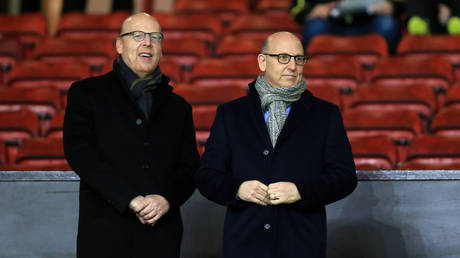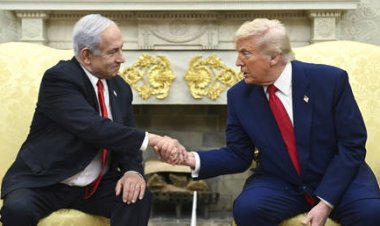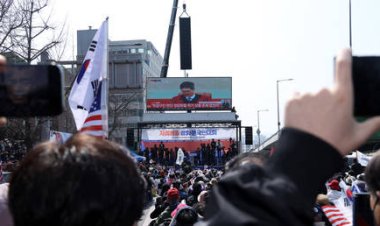The Glazer family have been the primary owners of Manchester United since 2005
Antipathy to the near-two decade ownership by the US-based Glazer family has exploded again among Manchester United fans, after the team suffered a humiliating start to the new Premier League season.
United appear to be falling ever further from their heyday, and in recent seasons have had to watch on as bitter rivals Manchester City and Liverpool have come to dominate the elite of English football.
Compounding the current strife at Old Trafford is the transfer saga surrounding the wantaway Cristiano Ronaldo, along with the widespread belief that the current United squad remains in major need of an overhaul if they are to end their five-year trophy drought.
But above all, the primary target of fans' ire remains the Glazers – especially as rumors of a potential takeover push by a British billionaire continue to swirl, offering hope of a savior for the United faithful.
Here, we look at why Red Devils fans are revolting so strongly against the club's American financial backers.
When did the Glazers take over?
Family patriarch Malcolm Glazer first invested in Manchester United in 2003, initially with just a 2.9% share but by the end of that year he had assumed control of around 15% of shares. Glazer had owned the NFL's Tampa Bay Buccaneers since 1995.
Former manager Ferguson chats to Joel and Avram Glazer in 2009. © Martin Rickett /PA Images via Getty Images
Separately, another drama was brewing at Old Trafford. The club's two majority shareholders, John Magnier and JP McManus, became entangled in a row with Manchester United's legendary manager Alex Ferguson regarding the ownership rights of a prominent racehorse. This led to a high-profile legal battle, and even to Magnier and McManus hiring a private investigator to look into transfer dealings involving Ferguson and his son Jason, who worked as a football agent.
By 2005, Magnier and McManus’ 28.7% stake was sold to the Glazers and a new era was underway at one of the world's most famous football clubs, with an eventual sum of around £800 million ($950 million at current rates) being paid to take control.
Why are the Glazers so disliked by the Manchester United fanbase?
Supporter groups immediately expressed unease at the new US ownership, primarily due to the terms of the deal saddling the club with debt. The club had been debt-free prior to the Glazers becoming involved.
The chief argument among Red Devils fans related to that of the perceived greed of the ownership group, who are estimated to have taken around £1.1 billion out of the club's coffers since 2005, while also guaranteeing a £550 million loan used to finance the purchase of the club against the club itself.
Read more
Scrutiny intensifies on US owners after English giant’s latest humiliation
Some reports have said that Man United have paid £743 million in interest alone against the loan without actually paying it off, with recent estimates indicating that close to £600 million remains outstanding.
Another issue is the dividend payments distributed to owners, the vast majority of whom are Glazers, and the Independent estimates this to be in the region of £22 million per season.
Fans have also been angered by the contrast of their Premier League rivals such as Chelsea and Manchester City, whose owners have plunged countless millions into the club without financial strings attached. United's owners have instead taken money out of the club while the team struggles and the stadium becomes increasingly decrepit.
Is there any defense for the Glazers?
Critics of Manchester United will point to the club's considerable outlay in the transfer market and hefty spending on wages in recent years as evidence that the Glazers are willing to invest in the transfer market when required – but ask a Manchester United supporter and they will be quick to tell you that the money the club spends is generated by the club itself, and doesn't come as outside investment from the United States.
READ MORE: Man Utd coach lays into players following embarrassing loss and Ronaldo snub (VIDEO)
Others will note that the early years of the Glazer ownership coincided with some of the most trophy-laden in the club's history, given that they won several league titles and a Champions League towards the end of Alex Ferguson's tenure.
But the departures of Ferguson and former chief executive David Gill in 2013 only served to remove the stabilizers upon which the club had been navigating since the Glazer takeover, and ushered in a new era of mediocrity at Old Trafford which continues to this day.
How have fans protested against the Glazers?
Protests against the Glazer family have existed as long as the family has been associated with Manchester United. The Glazers are deeply unpopular figures at Old Trafford and are rarely seen inside the stadium (Malcolm Glazer never once visited the club).
Read more
Furious Manchester United fans storm Old Trafford hours before Liverpool Premier League match in anti-Glazer protest (VIDEOS)
Immediately upon the takeover in 2005, rebel fans set up a non-league club called FC United of Manchester, which still exists to this day in the seventh tier of English football and is just one of two fan-owned clubs in the English football pyramid – a direct retaliation to the perceived strong-handed ownership tactics imposed by the US-based tycoons.
Add to that the various other protests which have been seen down the years, such as demonstrations outside the stadium to planes flying above it displaying 'Glazer Out' messages, and the fan outrage is clear to see.
It seemed to have come to a head last season when furious Manchester United fans stormed the pitch ahead of a fixture with arch-rivals Liverpool in protest against the Glazers, forcing the postponement of the Premier League fixture. That fury came in the wake of United's involvement in the ill-fated European Super League project.
Further protests are expected at Old Trafford this coming Monday ahead of United's latest home match with Liverpool, with fan group The 1958 issuing instructions on where to gather and what to do online.













